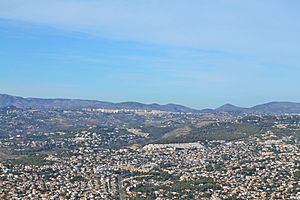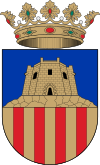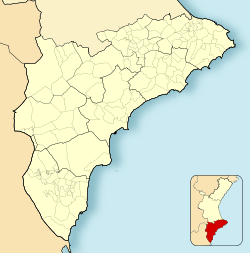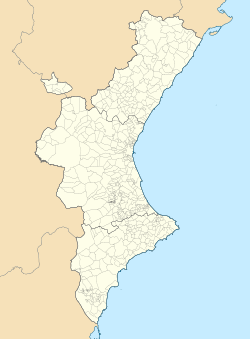Benissa facts for kids
Quick facts for kids
Benissa
|
|||
|---|---|---|---|
 |
|||
|
|||
| Country | |||
| Autonomous community | |||
| Province | Alicante | ||
| Comarca | Marina Alta | ||
| Judicial district | Dénia | ||
| Area | |||
| • Total | 69.71 km2 (26.92 sq mi) | ||
| Elevation | 254 m (833 ft) | ||
| Population
(2018)
|
|||
| • Total | 10,768 | ||
| • Density | 154.469/km2 (400.07/sq mi) | ||
| Demonym(s) | Benissenc, benissenca | ||
| Time zone | UTC+1 (CET) | ||
| • Summer (DST) | UTC+2 (CEST) | ||
| Postal code |
03720
|
||
| Official language(s) | Valencian | ||
Benissa is a charming old town in Spain. It is located in the province of Alicante. The town sits 275 meters (about 900 feet) above sea level. It is also one of the oldest towns on the beautiful Costa Blanca coast.
Benissa has a lovely 4-kilometer (2.5-mile) coastline. It connects the towns of Moraira and Calp. Along the coast, you can find amazing views. These include tall cliffs, rocky coves, and sandy beaches. There are also tiny bays. The area around Benissa also has terraced vineyards, mountains, and palm trees. You can see traditional Spanish village houses. They often have doorsteps right onto the street. Many have hidden courtyards inside. There are also old finques, which are like country estates. These sit on large plots among vineyards and offer amazing views of the sea.
Nearby towns along the Costa Blanca include La Fustera, Cala dels Pinets, Cala de La Llobella, Cala l'Advocat, Baladrar, and Cap Blanc. These are all before you reach Moraira.
Contents
History of Benissa
The name Benissa comes from Arabic words. It means "sons of Christ." This name was given by the Arab tribes who lived there long ago.
Christian Reconquest
In 1248, Christian armies took back the town. This was led by James II of Aragon. People from the Pyrenees, Catalonia, and Aragon settled in Benissa. Many of the original Muslim people stayed for centuries. However, the last Muslim citizens were asked to leave in 1609.
Pirate Attacks
Benissa, along with nearby towns like Altea, Calp, and Teulada, was once part of a large area ruled by powerful leaders. One of these leaders was a famous admiral from Sicily named Roger of Lauria. In the 1400s and 1500s, Benissa faced many attacks. These attacks came from pirates from Africa.
Exploring Benissa's Sights
Benissa has a very well-preserved medieval town center. It feels like stepping back in time.
Town Center and Buildings
You can walk through its old town square and narrow streets. Many historic buildings are decorated with beautiful ironwork balconies. They also have special shields showing family symbols. The Palace of Torres-Orduña is a grand old building. Today, it is open to everyone. It serves as a cultural center and a library.
Religious Heritage
Benissa has a strong Catholic history. There is a Franciscan seminary there. A seminary is a school where people study to become priests. This seminary has taught many Franciscan followers from all over Spain. The town also has a large church built in the Neo-Gothic style. It is known as the "Catedral de la Marina."
Getting to Benissa
It is easy to travel to Benissa. You can come from Alicante or Valencia.
Road Travel
You can use the A-7 highway or the N332 road. The closest airport is the Alicante airport. It is about 70 kilometers (43 miles) southwest of Benissa.
Train and Tram Services
The main Spanish railway station (RENFE) is in Alicante. Benissa also has an Alicante TRAM station. This tram connects to the network through Benidorm. However, the tram service between Teulada and Dénia has been stopped since 2016. This is because the line is being upgraded. Buses are currently used instead of the tram on this part of the route.
Exciting Events in Benissa
Benissa hosts several fun events throughout the year.
- Fira i Porrat de Sant Antoni: This is a medieval fair. It usually takes place in January.
- Festes Patronals de la Puríssima Xiqueta: These are the main town festivals. They are usually held in the last week of April. They celebrate the town's Patron Saint. The festivals include concerts, traditional bull running, street parades, and sporting events.
- Moros i Cristians: This festival is held at the end of June. It celebrates the historical battles between the Moors and Christians. These battles happened in the 13th to 15th centuries.
See also
 In Spanish: Benisa para niños
In Spanish: Benisa para niños
 | Percy Lavon Julian |
 | Katherine Johnson |
 | George Washington Carver |
 | Annie Easley |






